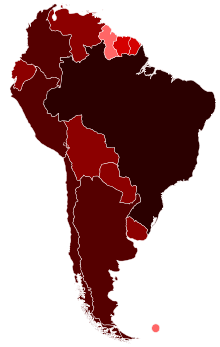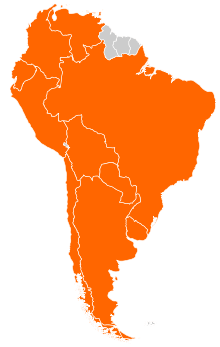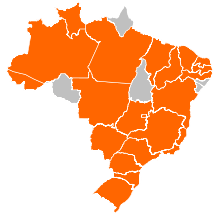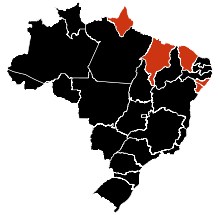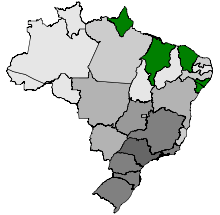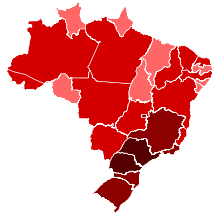| Country | Cases | Deaths | |
|---|---|---|---|
| Laboratory confirmed | Estimated Cases | Confirmed | |
| Totals | 71,237 | 2,686,934 | 2,473 |
| 28,886[2] | +1,000,000[2] | 1,205[2] | |
| 12,252 | +600,000[3] | 132 | |
| 9,119 | ~1,000,000[4] | 580 | |
| 9,268 | +100,000 | 221 | |
| 3,056 | 10,000 | 33 | |
| 2,371 | 2,500 | 111 | |
| 2,269 | 5,000 | 56 | |
| 2,002 | 3,000 | 67 | |
| 1,782 | ~10,000 | 91 | |
| 682 | 6,044 | 42 | |
| 191[5] | ~200 | 1 | |
| 73 | 100 | 0 | |
| 67 | 70 | 2 | |
| 7 | 20 | 0 | |
Affected countries
 Argentina
Argentina
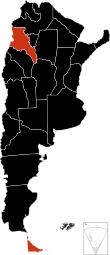 Outbreak evolution in Argentina Confirmed cases Unconfirmed or suspected cases |
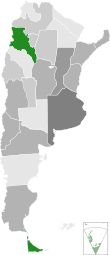 Outbreak evolution in Argentina 1+ death 10+ deaths 50+ deaths |
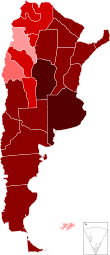 Outbreak evolution in Argentina 50+ cases 10+ cases <5 cases |
According to an Epidemic Alert order issued by the Ministry of Health, Airlines have been required to report passengers with influenza symptoms arriving from Mexico and United States. Passengers from these countries must fill out a form to be located should they experience any symptoms.[6] In addition, the government has also stepped up safety checks, and thermal scanners are being used on airports to detect passengers with fever and other influenza symptoms. As of 28 April, the Government has suspended all flights originated from Mexico until 15 May as a precautionary measure.[7]
On 7 May, Health Authorities confirmed the first case, a tourist that had recently returned from Mexico. 55 other suspected cases continue to be studied under isolation.[8]
On 15 June, there were 89 new confirmed cases, increasing the number of cases to 733. First confirmed death.
A case of human-to-swine transmission was discovered in Buenos Aires province, on 25 June. The hog farm where it occurred has been interdicted.[9]
On 2 July, the newly appointed Minister of Health Juan Luis Manzur estimated the number of affected people to be as many as 100,000, as well as 52 confirmed deaths.[10][11]
As of 14 July, the number of officially recognised cases has skyrocketed, with 137 deaths.[12]
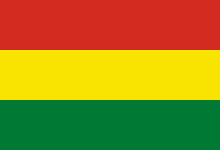 Bolivia
Bolivia
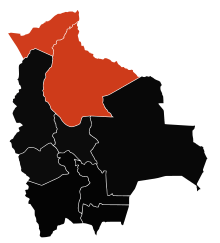 H1N1 in Bolivia |
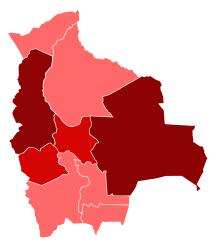 H1N1 in Bolivia |
As of 15 September, according to Agencia Boliviana de Información the number of cases is over 1,600 .[13] The department with more cases is Santa Cruz with more than 900 cases. Due to the increasing amount of cases Bolivian authorities have given students two additional weeks of vacations. Viru Viru International Airport (Santa Cruz) authorities are checking every international and national passenger arriving. Due to the increasing amounts of cases Bolivian authorities are canceling concerts and other big events. The Daddy Yankee concert is already suspended and expected for August. The only departament with no cases is Pando, and it is the least populated departament. Two deaths have been confirmed on 10 July, One from a six-year-old girl and one from a 50-year-old man both from Santa Cruz. Most Museums, Cinemas and theaters are closed in Santa Cruz. Most restaurants are open and the biggest cinema in Bolivia, Cine Center are open. The third death has been confirmed on 16 July. It was the first confirmed death in the departament of La Paz. Pando, the only departament in Bolivia without the flu has now some suspected cases. As 21 July Bolivia has 5 confirmed deaths. The number of cases and deaths are increasing every day. Risently deaths have been confirmed in Tarija and Potosi making the numbers of deaths rise to 9. Confirmed deaths in El Alto and Cochabamba rise the numbers of deaths to 13. Some private and public schools have closed in Santa Cruz after finding students infected with the flu. The actual number of deaths is 35.
 Brazil
Brazil
Two people who had arrived in Brazil from Mexico with symptoms of an undefined illness were hospitalized in São Paulo on 25 April. It was initially suspected that they were suffering from the swine flu virus.[14] The Brazilian Ministry of Health later issued a press release stating that while the exact cause of the two patients illnesses remained unknown, they "did not meet the definition of suspected cases of swine influenza because they did not have signs and symptoms consistent with the disease: fever over 39 °C, accompanied by coughing and/or a headache, muscle and joint pain."[15]
The press release also stated that airports would monitor travelers arriving from affected areas, under the direction of the National Sanitary Surveillance Agency (ANVISA). Air crews were trained on signs and symptoms of swine influenza so that passengers displaying symptoms would receive guidance from ANVISA upon arrival.
On 30 May, the Minister said that the country has 20 confirmed cases, 8 in São Paulo, 5 in Rio de Janeiro, 4 in Santa Catarina, 1 in Minas Gerais, 1 in Rio Grande do Sul and 1 in Tocantins. Three of the 5 cases in Rio are of transmission inside the country and two of the four in Santa Catarina are two.
On 2, 3 June more cases were confirmed, one in São Paulo and two in Rio de Janeiro, increasing the number of cases to 23.
On 4 June, the number of confirmed cases increase to 28 with another 3 in São Paulo and 2 in Mato Grosso do Sul.
On 19 June, the total number of confirmed cases was 131,[16] being 55 in São Paulo, 26 in Santa Catarina, 19 in Minas Gerais, 15 in Rio de Janeiro, 4 in Tocantins, 3 in Distrito Federal, 2 in Espírito Santo, 2 in Goiás, 2 in Mato Grosso, 1 in Bahia, 1 in Rio Grande do Norte and 1 in Rio Grande do Sul.
On 6 August, the total number of confirmed cases was 10,894, the suspect cases was 200,000 and the deaths was 140.
On 26 August, Brazil is the country with the bigger number of deaths, surpassing even USA and Mexico, with 557 deaths.
 Chile
Chile


Confirmed Cases
On 27 April, the Assistant Secretary of Health Jeanette Vega, confirmed that there are eight suspected cases of swine influenza in the country, which are being examined at the Hospital del Tórax in Santiago. Five other cases have been dismissed by the authorities.[17]
On 28 April the Health Ministry announced 26 cases under investigation: 16 in Santiago; 2 in Atacama; 2 in Valparaíso; 4 in O´Higgins Region; 1 in Biobío and 1 in Araucanía. 16 other cases have been dismissed.[18]
On 1 May, the Health Ministry announced that it continued to investigate 4 suspected cases: 2 in Santiago, 1 in Valparaíso and 1 in Araucanía. To date, 80 suspected cases have been examined by the Health Ministry; 76 of those have been dismissed.[19] Another suspected case was identified on 2 May, bringing the number of cases under investigation to 5.[20]
On 10 May, the Health Ministry announced that 116 cases have been dismissed, and there are no cases pending test results.[21]
On 17 May, the Chilean Health Minister confirmed, the first case of A(H1N1) flu in Chile,[22] the same day two more cases were confirmed.[23]
On 29 May, the Chilean Health ministry confirmed the number of cases of A-H1N1 had risen to 224,[22] the same day two more cases were confirmed.[24]
On 3 June Chile suffered its first confirmed death of swine flu. A 37-year-old man from Puerto Montt.[25]
On 9 June, the Ministry confirmed the number of cases had risen to 1694 and the number of deaths to 2. In this report, the minister stated that 1.7% of the cases have required hospitalization, 0.12% have resulted in death, 35.3% are being isolated in their residences while the remaining 63% are said to be in full recovery.[26]
On 12 June, the Ministry confirmed the number of cases had risen to 2335. In the report, the minister stated that 2.4% of the cases have required hospitalization, 0.08% (2 cases) have resulted in death, 53% of the cases are men and 66% is from 5 to 19 years old.[27]
 Colombia
Colombia
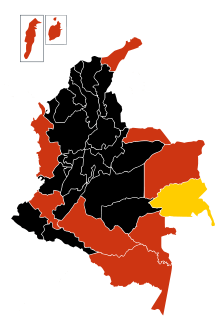 H1N1 in Colombia |
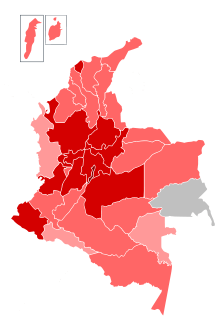 H1N1 in Colombia |
The Minister of Social Protection, Diego Palacio Betancourt, announced on 26 April 2009, that 12 suspect cases had been detected, 9 in Bogotá and 3 on the Caribbean coast. Samples of the virus have been sent to the USA for comparisons and analysis. Results of the testing were expected within few days. On 27 April, the Government declared a "national disaster" state[28] in order to face the emergency, which allowed health authorities to have a special budget to do so.[29] As of 28 April, most of the suspect cases were excluded, with only four remaining: three Mexican teachers in Bogotá, and one person in Cartagena.[30] Another 38 suspect cases were under observation.[31] On 29 April, the suspect cases raised to 49, with 10 of them "highly" suspect.[32] The government purchased 400,000 oseltamivir(Tamiflu) doses, which will be distributed through the Social Protection ministry to the affected if there are confirmed cases.[33]
On 3 May 2009, Minister Palacio confirmed the first case of A(H1N1) in Colombia,[30] in a 42-year-old person from Zipaquirá, who recently travelled to Mexico.[34] According to Palacio, only one out of 18 tests sent to Atlanta was positive. The patient was isolated and put under medical treatment. On the same day, Palacio stated there were 108 suspect cases in the country. On 9 June, first death of H1N1 was confirmed.[34] Ten days later, a local newspaper El Tiempo announced a new death on Bogota, reported at 21 June.[35] On 17 July, El Tiempo reported the first death of swine flu outside of Cundinamarca, which is also the seventh in all of Colombia.[36]
On 30 August 2009, El Tiempo reported that president Álvaro Uribe had contracted the AH1N1 flu virus, becoming the second head of state to do so (the first being Óscar Arias).[37]
 Ecuador
Ecuador
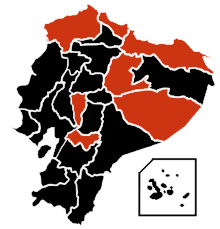
Health officials are carrying out checks on people with flu symptoms entering the country from sea or air.[38] On 29 April, Ecuador closed its borders to Mexican citizens and foreigners of other nationalities arriving from Mexico for a period of 30 days.[39] On 15 May, Health officials confirmed the first case of AH1N1 flu in Ecuador.[40] On 20 May, the Health Department confirmed 7 more new cases of AH1N1, raising the total number of infected people to 8,[41] the number has now risen to 41.[42]
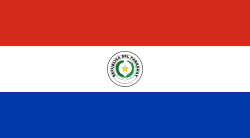 Paraguay
Paraguay
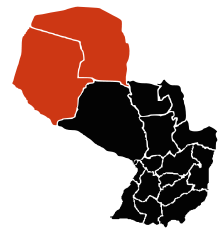
On 1 June, the Minister of Health confirmed the first 5 cases in the country but stated that the situation was under control.[43]
On 8 June, twenty more cases were confirmed by the Ministry of Health raising the total number to 25.[44]
On 21 July 195 cases were confirmed by the Ministry of Health and 13 deaths.
On 8 August, the total number of confirmed cases was 244, the estimated cases was 3.629 and 27 deaths.
 Peru
Peru
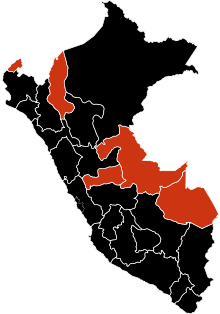
The Governor of Callao, Alex Kouri, ordered that all passengers from any infected country, mainly Mexico, Canada and US, must be checked before their arrival on Peruvian territory. Also, the Peruvian government must be warned of any case or symptom of fever. This step is in order to prevent any infections, since the main port and airport of Peru are located in Callao. Also, the government has prepared a special area at the Hospital "Daniel Alcides Carrión" to treat cases of this disease.[45]
The first suspicious case has been detected in the morning of 27 April 2009. It was a Peruvian woman who returned from Mexico.[46]
In Peru 5 people were considered suspects with the virus, but as of 28 April have been confirmed to be healthy and not carrying the H1N1 virus. The government has stated that the country is clean, but efforts are being made to examine slaughterhouses and they are screening incoming passengers from problem areas.[47]
On 29 April, Peru's Health Minister Oscar Ugarte confirmed one case of swine flu. On 30 April, he said the case is not entirely confirmed. Having recently visited Mexico, the patient was flying in a Copa Airlines airplane from Panama to Buenos Aires on 28 April, but the flight was diverted to Lima due to her illness. The crew only notified of the suspicion of swine flu only after the passenger had checked in the airport. Three more suspected cases were being investigated. Ugarte also announced the suspension of all commercial flights from Mexico to Peru.[45] On 14 May, Ugarte totally confirmed a case of swine flu from a Peruvian woman who returned from New York, plus another suspected case in Trujillo from another woman in the same flight. On 17 May, the second case was confirmed, an American born man residing in Arequipa. He had returned from the US on 12 May, not showing any symptoms until two days later.[48]
On 18 May a new case was confirmed, a scholar returning from a trip to Dominican Republic, that studied in the Altair school. Classes for her class in that school had been suspended until 25 May. 19 May, another case of a scholar from the same trip to Dominican Republic. Student had contact with 3rd victim and both studied in the same school.[49]
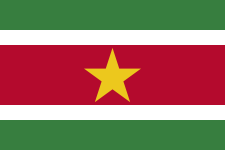 Suriname
Suriname
On 15 June, the first case of flu was confirmed in the country.[50] On 25, 13 June more cases were confirmed. As of 12, 18 August cases are confirmed in Suriname.
 Uruguay
Uruguay
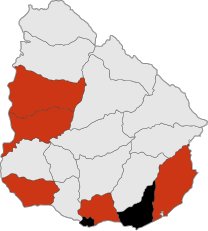
Uruguay confirmed its first two cases on 27 May in a 27-year-old man and a 15-year woman who recently arrived from Argentina.[51]
On 8 June, two private schools in Montevideo were closed in order to prevent an increase in the number of infected people.[52]
On 11 June, the number of cases on Uruguay increased to 36.
As of 12 June, the Ministry of Health won't give anymore information about new cases, since the flu has entered into a pandemic phase, arguing that it's no longer needed. However, they will start studying possible outbreaks inside the country. To date, there are 1500 suspected cases.[53]
As of 22 June, the Ministry of Health confirmed 195 cases present in the country.[54]
On 29 June, the first death due to A H1N1 Influenza happens.
As of 3 July, four persons died because of this flu.
On 14 July the Ministry of Health confirmed 15 deaths as caused by this flu.
 Venezuela
Venezuela
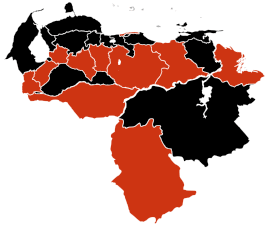
Controls have been raised at airports to prevent contagion from spreading. Travellers from the United States and Mexico with flu symptoms are being isolated until they are given the all clear. Pig farms in the country are being "closely inspected" and stockpiles of medicines built up.[38]
On 28 May the Health Minister, Jesús Mantilla, confirmed the first case of the A/H1N1 flu in a Venezuelan citizen who arrived in a flight from Panama four days ago. He was isolated to the place he is receiving treatment and his condition is stable.[55] The following day, a second case was confirmed from another person who also arrived from the same flight.[56]
On 1 June another case was tested positive and was also linked to the previous two cases.[57]
On 3 June a fourth case was confirmed from a male citizen who arrived from Brazil. The Minister of Health confirmed that all the patients are stable and there is no need to alarm the population.[58]
On 8 June, the number of confirmed cases increased to 12 also from citizens who arrived from Panama, France and the U.S.A.[59] Later that day a 13th case was confirmed, this time an 9-year-old boy who recently came from Colombia.[60]
On 9 June, one more case was confirmed again in the Andean region.[61]
On 14 June, The number of Venezuelans infected with the virus AH1N1 rose to 44 this day, reported in statements to the Bolivarian News Agency (ABN) the Deputy Minister of Health Networks of the Ministry of People's Power for Health Nancy Perez. In this way, 44 cases of the virus AH1N1 in the country are divided into the following Federal Entities: 17 Miranda, Anzoategui 10; Táchira 4 Aragua 4; Mérida 2; Vargas 2; Bolivar 2; Zulia 1; Carabobo 1 and Nueva Esparta 1.[62]
On 18 July, the first death by the virus was confirmed.
Timeline
References
- ↑ "OMS pide seguir atentos a gripe porcina y alerta de llegada a hemisferio sur". El Economista (in Spanish). 5 May 2009. Archived from the original on 1 June 2009. Retrieved 7 July 2009.
- ↑ 2.0 2.1 2.2 Sum of state reported confirmed cases; See 2009 flu pandemic in Brazil for more information.
- ↑ "Estiman en medio millón los casos de gripe en Chile". InfoMED (in Spanish). 7 July 2009. Archived from the original on 10 September 2009. Retrieved 31 July 2009.
- ↑ Lerner (Sep 2009). "INFLUENZA PANDÉMICA (H1N1) 2009. REPÚBLICA ARGENTINA". Ministerio de Salud (in Spanish). Archived from the original on 9 September 2009. Retrieved Sep 2009.
- ↑ "GRIPPE A/H1N1. 5 cas à Wallis, 2 nouveaux cas en Guyane". RFO (in French). 4 August 2009. Archived from the original on 10 September 2009. Retrieved 8 August 2009.
- ↑ Heguy, Silvina (26 April 2009). "La Argentina ya controla a los pasajeros que llegan a Ezeiza". Clarín (in Spanish). Retrieved 28 April 2009.
- ↑ "Por la gripe porcina, el Gobierno suspende los vuelos con México". Clarín (in Spanish). 27 April 2009. Retrieved 28 April 2009.
- ↑ "Argentina confirms first H1N1 flu case". Reuters. 7 May 2009. Archived from the original on 11 May 2009. Retrieved 7 May 2009.
- ↑ MercoPress, "Human-To-Swine A/H1N1 Virus Contagion In Argentine Hog Farm", 26 June 2009, (accessed 27 June 2009)
- ↑ "Ya hay en el país 100.000 contagiados por la gripe A". La Nación (in Spanish). 2 July 2009. Archived from the original on 9 September 2009. Retrieved 2 July 2009.
- ↑ "Confirman seis muertes más por el virus en la ciudad". La Nación (in Spanish). 3 July 2009. Archived from the original on 9 September 2009. Retrieved 3 July 2009.
- ↑ "La Argentina es el segundo país en cantidad de muertos por gripe A". La Nación (in Spanish). 14 July 2009. Retrieved 14 July 2009.
- ↑ "Agencia Boliviana de Información – ABI". Archived from the original on 10 September 2009. Retrieved 8 September 2009.
- ↑ "Hospital em SP examina suspeita de gripe suína no País" (in Portuguese). Agencia Estado. 26 April 2009. Archived from the original on 28 April 2009. Retrieved 27 April 2009.
- ↑ "Ocorrências de casos humanos de influenza suína no México e nos EUA" (Press release) (in Portuguese). Brazilian Ministry of Health. 26 April 2009. Archived from the original on 29 April 2009. Retrieved 27 April 2009.
- ↑ "Com 17 casos novos, Brasil já tem 131 com gripe suína – Estadao.com.br". Archived from the original on 10 September 2009. Retrieved 8 September 2009.
- ↑ "El sitio de noticias online de Chile". Emol.com. Archived from the original on 29 April 2009. Retrieved 28 April 2009.
- ↑ "Minsal confirma 26 casos en estudio por gripe porcina en el país". 29 April 2009. Retrieved 29 April 2009.
- ↑ "Minsal analiza cuatro casos sospechosos de influenza humana en Chile". 1 May 2009. Archived from the original on 3 May 2009. Retrieved 1 May 2009.
- ↑ "Minsal informa que existen cinco casos en estudio por gripe porcina en el país". 2 May 2009. Retrieved 2 May 2009.
- ↑ "Reporte Diario de Situacion de Influenza A-H1N1". 10 May 2009. Archived from the original on 20 May 2009. Retrieved 12 May 2009.
- ↑ 22.0 22.1 "Confirman primer caso de influenza H1N1 en Chile". 17 May 2009. Archived from the original on 20 May 2009. Retrieved 17 May 2009.
- ↑ "Nuevo caso de influenza H1N1 en Chile: Amiga de afectada arrojó positivo en exámenes". 17 May 2009. Archived from the original on 20 May 2009. Retrieved 17 May 2009.
- ↑ "A/H1N1 flu infections rise to 224 in Chile". 29 May 2009. Archived from the original on 18 June 2009. Retrieved 30 May 2009.
- ↑ "ISP confirms first swine flu death in Chile". 2 June 2009. Archived from the original on 11 June 2009. Retrieved 7 July 2009.
- ↑ http://www.terra.cl/actualidad/index.cfm?id_cat=302&id_reg=1196036
- ↑ Gcastro (12 June 2009). "NFORME SITUACIÓN DE INFECCIÓN POR NUEVA INFLUENZA A (H1N1)" (in Spanish). Ministry of Health (Chile). Archived from the original on 10 September 2009. Retrieved 14 June 2009.
- ↑ "Colombia declara situación de desastre para enfrentar la gripe porcina" (in Spanish). Caracol TV. 27 April 2009. Archived from the original on 3 May 2009. Retrieved 28 April 2009.
- ↑ "Colombia declares state of emergency over swine flu threat". Colombia Reports. 27 April 2009. Archived from the original on 29 April 2009. Retrieved 28 April 2009.
- ↑ 30.0 30.1 EFE (28 April 2009). "Bajan a cuatro los casos de sospecha de gripe porcina en Colombia" (in Spanish). El Espectador. Archived from the original on 3 May 2009. Retrieved 28 April 2009.
- ↑ "A 42 se elevan los casos sospechosos de gripe porcina en Colombia" (in Spanish). Caracol TV. 28 April 2009. Archived from the original on 3 May 2009. Retrieved 28 April 2009.
- ↑ "Aumentan casos 'sospechosos' de gripe porcina en Colombia" (in Spanish). Caracol Radio. 29 April 2009. Retrieved 29 April 2009.
- ↑ "Medicamento para tratar gripe porcina ya está en Colombia" (in Spanish). Caracol TV. 29 April 2009. Archived from the original on 3 May 2009. Retrieved 29 April 2009.
- ↑ 34.0 34.1 "Bajo tratamiento médico y estable se encuentra primer contagiado en Colombia con AH1N1" (in Spanish). Caracol Radio. 2 May 2009. Retrieved 3 May 2009.
- ↑ "Noticias de Bogotá – ELTIEMPO.COM -> Segunda muerte por nueva influenza confirmó Secretaría de Salud de Bogotá este domingo". Archived from the original on 10 September 2009. Retrieved 8 September 2009.
- ↑ http://www.eltiempo.com/vidadehoy/salud/nuevagripa/reportan-la-septima-muerte-por-nueva-influenza-en-colombia-una-mujer-oriunda-de-viterbo-caldas_5626207-1
- ↑ http://www.eltiempo.com/vidadehoy/salud/nuevagripa/presidente-lvaro-uribe-contrajo-el-virus-de-la-nueva-influenza_5976590-1
- ↑ 38.0 38.1 The world response to flu crisis, BBC News, 28 April 2009. Retrieved on 2009-04-30.
- ↑ Ecuador restringe por un mes vuelos a México, El Universal, 29 April 2009.
- ↑ ECUADOR HABRIA CONFIRMADO PRIMER CASO DE GRIPE AH1N1
- ↑ http://eluniverso.com/2009/05/20/1/1384/EF26D2D8E533454B8918EAC264EFE819.html
- ↑ http://www.eluniverso.com/2009/06/02/1/1384/EF11A9A1F8CC4B96B4068EF48F380F27.html
- ↑ http://www.ultimahora.com/notas/225915-gripe-a-h1n1-est%C3%A1--relativamente--controlada-en-paraguay
- ↑ http://www.abc.com.py/2009-06-09/articulos/529752/salud-confirma-25-casos-de-gripe-a-h1n1-en-paraguay
- ↑ 45.0 45.1 "Perú toma precauciones con la gripe porcina" (in Spanish). Radio Programas del Perú. 24 April 2009. Retrieved 25 April 2009.
- ↑ "Viajero procedente de México tiene aparentes síntomas de gripe porcina". El Comercio (in Spanish). 27 April 2009. Retrieved 27 April 2009.
- ↑ "News " Five Peru patients test negative for swine flu – Government discards threat". Living in Peru. Archived from the original on 3 May 2009. Retrieved 30 April 2009.
- ↑ "Peru confirms 2nd swine flu case in US man". Chron.com. 17 May 2009. Archived from the original on 19 May 2009. Retrieved 17 May 2009.
- ↑ http://www.elcomercio.com.pe/noticia/288650/ Escolar infectada con el virus AH1N1 es el tercer y no el cuarto caso en el Perú (In spanish)
- ↑ http://www.caribbeannetnews.com/news-17121--36-36--.html Suriname confirms first cases of swine flu
- ↑ http://news.xinhuanet.com/english/2009-05/28/content_11446895.htm
- ↑ http://data.com.uy/dos-colegios-de-montevideo-estaran-cerrados-desde-hoy-por-la-gripe-a/ (in Spanish)
- ↑ http://www.msp.gub.uy/ucepidemiologia_3156_1.html (in Spanish)
- ↑ http://www.cadenaglobal.com/Noticias/default.asp?Not=218605
- ↑ "Confirman el primer caso de gripe A/H1N1 en Venezuela" (in Spanish). Gobierno Bolivariano de Venezuela: YVKE Mundial. 28 May 2009. Archived from the original on 1 June 2009. Retrieved 28 May 2009.
- ↑ "Min. Salud confirma segundo caso de influenza A/H1N1 en el país" (in Spanish). Gobierno Bolivariano de Venezuela: YVKE Mundial. 29 May 2009. Archived from the original on 1 June 2009. Retrieved 29 May 2009.
- ↑ "De 228 muestras de gripe AH1N1, sólo 3 han resultado positivas" (in Spanish). Gobierno Bolivariano de Venezuela: YVKE Mundial. 1 June 2009. Retrieved 3 June 2009.
- ↑ "Min Salud confirma cuarto caso de Gripe A en Venezuela" (in Spanish). Gobierno Bolivariano de Venezuela: YVKE Mundial. 3 June 2009. Archived from the original on 15 June 2009. Retrieved 3 June 2009.
- ↑ "MinSalud: Confirmados 7 nuevos casos de Influenza A en Venezuela" (in Spanish). Gobierno Bolivariano de Venezuela: YVKE Mundial. 8 June 2009. Archived from the original on 15 June 2009. Retrieved 8 June 2009.
- ↑ "Autoridades sanitarias de Mérida atienden primer caso de influenza AH1N1" (in Spanish). Agencia Bolivariana de Noticias. 8 June 2009. Archived from the original on 21 June 2009. Retrieved 8 June 2009.
- ↑ "Corposalud first confirmed case of influenza in Táchira AH1N1 (14th in the country)". ABN. 9 June 2009. Retrieved 9 June 2009.
- ↑ "Ascienden a 44 los casos de gripe AH1N1 en el país" (in Spanish). Agencia Bolivariana de Noticias. 14 June 2009. Archived from the original on 10 September 2009. Retrieved 14 June 2009.
| ||||||||||||||||||||||||||||||||||||||||

